WASHINGTON, DC (May 6, 2020) – Researchers at the George Washington University Milken Institute School of Public Health (Milken Institute SPH) are developing a deep learning bioinformatics platform that will help scientists understand the genomic diversity of the novel coronavirus that causes COVID-19. The one-year project is supported by a $200,000 Rapid Response Research (RAPID) COVID-19 grant from the National Science Foundation.
Led by Gholamali (Ali) Rahnavard, PhD, an assistant professor of biostatistics and bioinformatics in the Computational Biology Institute (CBI) at Milken Institute SPH, the researchers will develop a platform to integrate clinical and omic data – such as transcriptomic data, metabolomic data, proteomic data, among others – to allow analysis of the novel coronavirus. This data integration will link unique characteristics of different viral genomes to different health outcomes, and includes data about the viral genetics, therapeutic strategies, and patient data, among other relevant information. The developed platform and its data integration and deep learning tools will allow healthcare professionals and researchers to examine genome diversity of the novel coronavirus to understand why it behaves differently from patient-to-patient. The tools can also be used to inform DNA tests that could predict the severity and status of the COVID-19 disease in patients.
“Understanding the viral and host genomic diversity and how this diversity is associated with differences in patient health outcomes will lead to better treatments, a comprehensive understanding of the different impacts observed in different populations of people, and pave the way towards more informed vaccine development,” Rahnavard said.
In addition, the research could help identify biomarkers that help predict disease severity and help scientists treat such cases with targeted therapy or early treatment. The research team developing the platform includes Marcos Pérez-Losada, PhD, an assistant professor in the CBI, and Keith Crandall, PhD, professor of biostatistics and bioinformatics and director of CBI.
The COVID-19 pandemic has already changed the world as it continues to spread, causing an enormous economic and human toll, said Pérez-Losada. Researchers are working at a fast pace to develop better treatments and vaccine options, yet the virus that causes COVID-19, like other viruses, continues to evolve. As a result, the virus is a moving target that the research team is building methods to quantify the variation of and relate to health outcomes, Crandall explained.
“A robust, repeatable informatics tool that integrates and analyzes the rapidly changing nature of the virus and the pandemic is essential to making informed predictions of health outcomes, such as the state of the illness or efficacy of treatments,” Crandall said.
The researchers are partnering with biotechnology company Aperiomics, Inc., Children’s National Medical Center and Kelly VandenBosche, PhD, a science teacher at Shady Side Academy in Pittsburgh, on the project.


